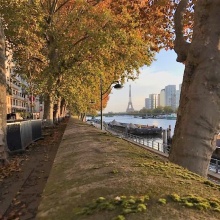For me personally, despite or even because of Corona, the semester abroad was a complete success.
Timo Mahringer
How did your studies abroad go? What positive or also negative experiences did you have?
Where to start and where to stop - Corona changed completely my semester abroad, both positively and negatively: For me, it was clear that I definitely wanted to go. Due to a stem cell donation, I already postponed the plan by one semester (luckily, otherwise I would have ended up in the first lockdown completely unprepared). My study situation was perfect and it wouldn't have fit any other way. Because of my knowledge of French, I wasn't afraid to be confronted with unexpected situations either. I already know Paris relatively well and a few friends of mine live there. So it was more of a visit and a lot of things were already well familiar. But to see the city without tourists is a sensation, you can spend your lunch break in front of the Eiffel Tower in peace, move comfortably through the city without being constantly run over. An experience I will (hopefully) never have again, but indescribably beautiful. At the same time, the semester abroad was an escape from the online lectures in Stuttgart, where I find it hard to follow staring at the screen all day long - completely without interaction. In France, there was also a lot of online teaching, but at least one day per week was on site - until the second lockdown came. Otherwise, there was always some variety due to the many teamwork submissions. Prepared for the lockdown, I then started to learn Italian and did other things I always wanted to do.
For me personally, despite or even because of Corona, the semester abroad was a complete success. Through personal contacts, I was able to continue participating in social life. On the other hand, if you are looking for the "feeling" of a semester abroad, with lots of exchange students from all over the world, lots of parties, lots of excursions, etc., I would advise you not to do it during Corona. In normal times (when they are hopefully close to being back by the time you read this report), I can only recommend Paris.
How many and which courses did you attend? Did you receive credit for the courses at the University of Stuttgart?
At ECE Paris, you can only choose one subject area, the subjects are then fixed (it's just a school), but you can choose two/three minor subjects/language courses yourself here and there. I myself have attended all the scheduled courses except for one, so 27.5 ECTS, although this is significantly more effort than in Germany, because the (intermediate) exams are written in the last week of lectures. I won't get credit for any of them, since I have already finished my bachelor's degree (except for the bachelor's thesis) and couldn't get credit for any subjects (even if I wanted to).
What is the course schedule?
Similar to a school, two subjects a day, each 3h, first theory, then practice, subjects such as team management, project management are added. Depending on the semester, a project (PPE) is created by the students, which then results in sprint weeks where only the project is worked on.
List positive and negative characteristics of your host city and country.
Good food, much better infrastructure than in Germany (a PCR test, for example, can be done easily without registration at many laboratories in the city, great rail network, super Internet expansion ...), incredibly rich history, many perfectly preserved historic buildings / works of art, lyrical language, pragmatic and very open attitude to life of many citizens, no cleaning mania as in many German households, as an EU member, you have it relatively easy as a German. Not so great are the high cost of living, a somewhat unsuccessful Corona policy, generally a somewhat more charged tension in terms of politics, a lot of bureaucracy, even Germany is partly better.
What tips can you give for recreational activities?
Having been to Paris, I'd like to just refer to the classic tourist guides. Small tip: ask residents or classmates where there are great bars, civic projects (like a self-managed sports and recreation terrain right next to the famous Père Lachaise cemetery), trendy neighborhoods, small oases of peace, etc.. That's nowhere in these books.
What recommendations can you give for financing the stay abroad?
Loosen up a lot of savings early on. The flat rate of 390€ per month is not enough for a long time. Rent of at least 700€/month must be expected (in Paris and surrounding areas). The cost of living is very high (food is expensive, but of good quality). Many landlords (including private ones) sometimes require up to 3 months rent in advance plus a deposit of about one to two months, commercial providers often require a lot of information (e.g. proof of income from parents or guarantees). The beginning of the exchange is therefore really expensive, then it gets better. Tip: the French family fund grants subsidies for rent also for foreigners, keyword APL. The application requires good language skills, or the buddies can help. At the time of Corona, it was unfortunately not possible to appear directly at the office, which would certainly have helped students with less language skills.


